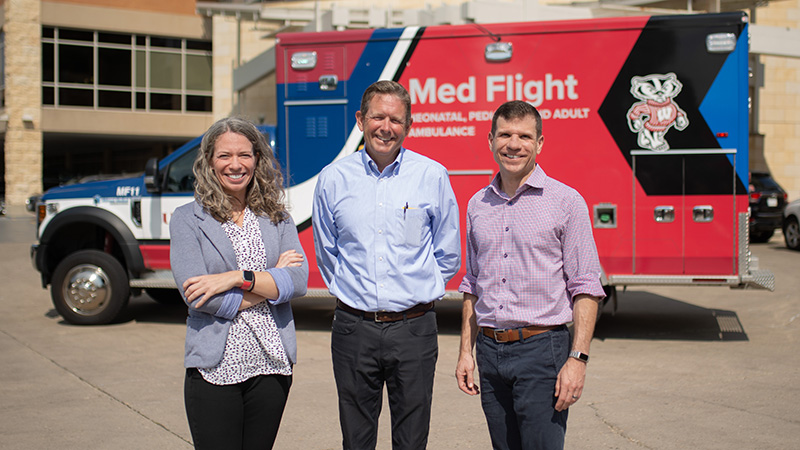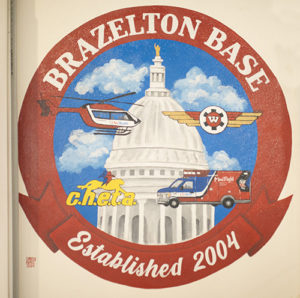
In the photo, left to right, are Drs. Allie Hurst, Tom Brazelton, and Nathan Lepp.
The end of August saw the dedication of the emergency ambulance bay at American Family Children’s Hospital for the pediatric and neonatal critical care transport team as “Brazelton Base.” It honors the founding medical director of the Pediatric/Neonatal Med Flight Critical Care Transport Program (now known as UW Health Med Flight), Tom Brazelton, MD, MPH, professor, Division of Critical Care.

This year marks several milestones and transformations for that UW Health transport service. Brazelton stepped away from his Med Flight leadership role in May to take on different responsibilities within UW Health, and Med Flight opened its third base outside Madison in Janesville in late June, expanding its service range and efficiency. A dedicated hangar at the Southern Wisconsin Regional Airport now supports a UW Health Med Flight helicopter and critical care ambulance. The other Med Flight regional bases are in Mineral Point and Portage, forming a triangle with Madison and American Family Children’s Hospital at its center.
When Brazelton joined the department in 2000, he arrived with many years of experience as an emergency medical technician with advanced certifications and a training background. He had also worked as a pediatric transport physician for children’s hospitals in both Oakland, California, and Boston, Massachusetts, in the six years before his appointment. Immediately, he was tasked with establishing a pediatric extracorporeal membrane oxygenation (ECMO) service at American Family Children’s Hospital, and by 2004 had launched its Children’s Hospital Emergency Transport Ambulance (CHETA). The service (and name) evolved first to UW Health Critical Care Transport Program (Med Flight and CHETA in 2017), then to today’s UW Health Med Flight in 2020. This year marks 20 years of Brazelton’s efforts to bring superlative pediatric patient transport to American Family Children’s Hospital and regional hospitals. Notably, UW Health Med Flight vehicles are equipped to accommodate ECMO service today.
“When we are waiting for that critically ill neonatal or pediatric patient, we don’t have the time windows that we have with adults nor the expertise in the referring hospitals,” Brazelton explained. “If we can take the ICU to them, we can stabilize them and their outcomes are going to be so much better.”
The pediatric and neonatal critical care transport team of UW Health Med Flight does just that: it takes the pediatric or neonatal ICU to the patient with a dedicated, highly skilled team that includes a pediatric subspecialty nurse, respiratory therapist, and necessary stabilization equipment on board. In addition, two aspects of UW Health Med Flight that make it particularly exceptional are that it will 1) pick up patients from an emergency scene or any hospital and transport them to any other hospital — not just to American Family Children’s Hospital, and 2) it has the ability to provide an emergency medicine physician on board the flight for additional specialized care. In these regards, it differs from other transport services.
When Brazelton stepped away from directing the service earlier this year, Nathan Lepp, MD, MPH, associate professor, Division of Neonatology and Newborn Nursery, became the medical director of UW Health Med Flight Neonatal Critical Care Transport. He has worked closely with UW Health Med Flight as associate medical director for the pediatric and neonatal critical care transport team since he joined the faculty in 2019. He noted that ongoing training for new fellows, NPs, and new transport team staff members can take six months, depending on their previous experience.
Ongoing medical education continues throughout the year of dedicated, specifically trained teams. “What really sets us apart from other transport teams in the region is that we can do, for example, ECMO, high-frequency ventilation, inhaled nitric oxide, and active cooling on transport,” Lepp explained. “We are a fairly modest-sized children’s hospital, but we have the capabilities and really exceptional transport team that provides everything a baby or a child could need. It is a testament to the staff and to the leadership that has been supportive of Med Flight, supporting the clinical things we are doing.”
Lepp also noted that since babies are not born at American Family Children’s Hospital (births occur primarily at UnityPoint Health – Meriter), those neonates entering the American Family Children’s Hospital NICU must come in through the Med Flight transport team. “Many of the region’s level III NICUs refer babies to us. We get babies from Wausau, Rockford, and La Crosse as well as many of the smaller hospitals throughout the state,” he said. The team has flown as far as Michigan’s Upper Peninsula. In 2019, the pediatrics and neonatology team did 477 transports. In 2023, that number rose to 778.
When Lepp was selected to direct Neonatal Critical Care Transport, at the same time, Allie Hurst, MD, MS, assistant professor of pediatric emergency medicine within the BerbeeWalsh Department of Emergency Medicine, was selected as medical director of UW Health Med Flight Pediatric Critical Care Transport. In addition, Hurst serves as medical director of the Pediatric Emergency Department at American Family Children’s Hospital and has an affiliate appointment in the Department of Pediatrics.
Hurst works closely with Kayla Scott, RN, pediatric and neonatal critical care transport team nurse manager, to arrange transport of pediatric patients from birth to age 18 into American Family Children’s Hospital. They specialize in transporting critically ill children, whether related to traumatic injuries or with chronic, complex, or rare medical conditions.
“The benefit of the rotor wing is the speed,” Hust explained. “And for those transports for especially very sick kids, then a provider of some sort comes along as well.”
Hurst was the first pediatric Med Flight fellow at the UW. She graduated from the program in 2021. “I’ve experienced what our transport teams can do firsthand,” Hurst said. “I have seen them work on incredibly sick kids from the littlest babies up to teenagers in many different capacities. The fact that we have dedicated pediatric and neonatal teams makes us unique in the complex care population, particularly kids who have chronic medical problems with extremely rare diseases. Our team is well-suited to troubleshoot issues with tracheostomy or ventilator issues. In the region, we are one of the few, if not the only specialized pediatric transport team.”
Hurst noted that the unique merger and crossover between the pediatric and neonatal team and the emergency medicine critical care transport team benefits both teams and enhances patient care.
Joshua Ross, MD, professor in the BerbeeWalsh Department of Emergency Medicine with an affiliate appointment in the Department of Pediatrics, was recruited by UW Health in 2009 to develop Pediatric Emergency Medicine. He became chief medical officer of American Family Children’s Hospital and UW Health Kids in July 2021. He is responsible for integrating clinical services and medical practices across the UW Health pediatric system of care.
Ross’s views of UW Health Med Flight’s nature and capabilities, and its expansion into its third base in Janesville, are illuminating. The third base in Janesville has been a long-term goal. Ross was present for the Mineral Point base opening and helped open the Portage base. “We shouldn’t have our aircraft here at American Family Children’s Hospital because we are not typically sending patients out,” Ross explained. “The three bases allow us to cover a broader part of the region.”
In addition, the special capabilities of the transport team and their clinical equipment expand the reach of the children’s hospital’s NICU and PICU outward beyond the physical hospital itself.
“To care for and transport our most critically ill and injured patients requires a great deal of clinical skill, collaboration, and logistical support,” Ross said. “Critical care transport is extremely complex, and I’m proud of the expertise and cooperation of our team. When minutes matter, the ability to bring the resources of our NICU and PICU, by air or ground, to community hospitals greatly benefits the children and families we serve.”
Photos by Bob Gordon/Department of Pediatrics